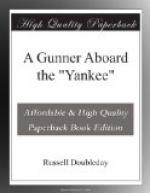It seemed more like a panorama, arranged for the amusement of an admiring crowd, than a fleet of floating forts ready at a moment’s notice to pour out death and destruction.
The flagship “New York,” gay with signal bunting, was the centre of a fleet of launches and small boats. The boats’ crews, in white duck, lounged in their places, while the captains were aboard conferring with the admiral.
The torpedo boat “Porter” flashed in and out between the grim battleships in an almost playful way.
A signal boy on the “Brooklyn” held a long wigwag conversation with the flagship, the bit of bright color showing sharply against the lead-colored turret.
It was hard to realize that only a few days ago these same ships, that now rested so calmly and majestically, were enveloped in clouds of smoke, their great guns spitting forth fire and a fearful hail of steel.
We looked at picturesque old Morro on the bluff, and there, close to the lighthouse, still floated the Spanish colors. It was aggravating, and we would like to have shot the hateful bunting away.
We had no sooner reached our station than the boatswain’s call echoed from one end of the ship to the other, “Away gig.” Whereupon the gig’s crew rushed below and “broke out” clean whites. No matter what happens, the gig’s crew must always be clean, both in person and apparel.
Our gig soon joined the fleet of waiting boats at the flagship’s gangway, and lay there while the captain went aboard.
The skipper returned about noon and went forward. Immediately, we heard the cry “All hands on the gig falls.” Then, before the boat was fairly out of water, we heard the engine bell jingle.
We were off again.
Some active member of the “Rumor Committee” said we were bound for Jamaica. And after consultation with a signal boy, who came aft to read the patent log, we found that we were heading for that island.
The wind was dead ahead and blowing fresh and cool, but the sun was hot, and the boatswain’s mates were instructed to keep the men in the shade as much as possible.
The stress and strain of the night before made the few hours of “caulking off,” that we now enjoyed, particularly grateful.
We lay so thick on the windward side of the spar deck under the awning, that it would have been difficult to find foot room.
Every hour a signal boy came running aft to read the log, which was attached to the taffrail on the starboard quarter. The log worked on the same principal as a bicycle cyclometer. It had two dials that indicated the miles and fractions of miles as they were reeled off. A long, braided line, having what we called a “twister” attached, trailed behind in the water and made the wheels go round, a certain number of revolutions to the mile.
Hour after hour the ship rushed through the water. The engines throbbed in a regular, settled sort of way, that reminded one of a man snoring. The wind blew softly and caressingly. The ship rolled easily in the long swell. It was soothing and restful, and we felt quite reconciled to life in the navy. We almost forgot that we were on an engine of war; that there was enough ammunition below to blow up several “Maine’s,” and that we were cruising in the enemy’s country.




